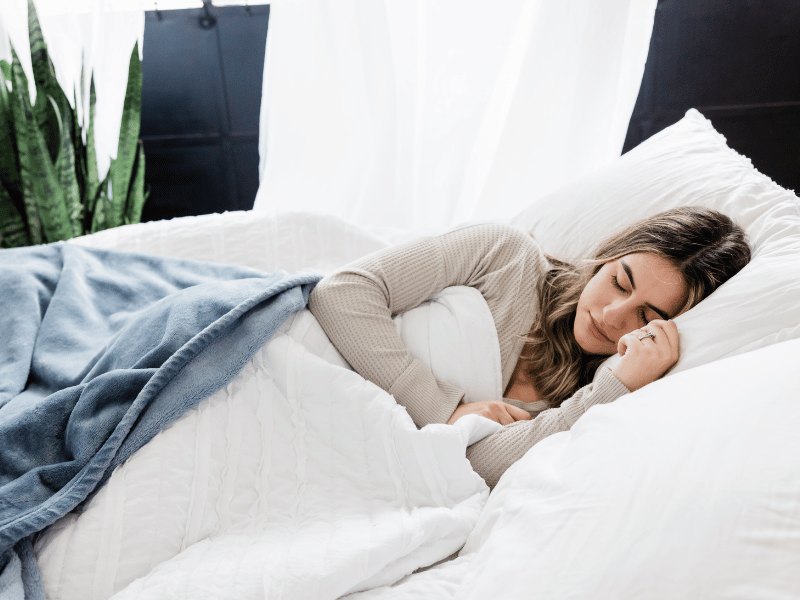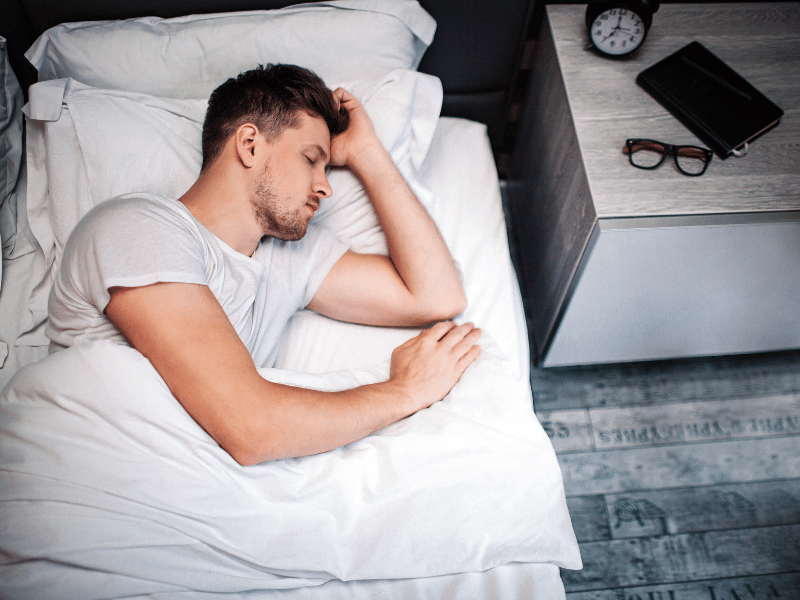


Having a stiff neck can be extremely uncomfortable and may impact the way you sleep at night. The sharp pain from turning your neck and body that you’re pretty much forced to sleep in one position the entire night. Find out how to sleep with a stiff neck in this article.
We will discuss the importance of quality sleep and explore strategies and tips to help you find comfort and relief.

A sore or stiff neck occurs when your neck muscles are strained or tense. This can happen for many reasons.
One of the common causes of a sore neck is a minor sprain or injury. This often arises from sleeping at an awkward angle, slouching for an extended period, looking down at your phone for a long time, being involved in a car accident, or a result of stress [1].
Other causes may include arthritis or meningitis [2].
If you want to get a good night’s sleep despite the stiffness in your neck, then what you need is a sleeping position that will ease the pressure or tension on your neck muscles and nerves.
Two sleeping positions that ease neck pain are sleeping on your side and sleeping on your back.

Sleeping on your side can help ease a painful neck as it keeps your head, neck, and spine aligned in a neutral position. According to a 2019 study, it was found that participants who slept mostly on their side did not report much neck pain issues compared to those who did not sleep on their side [3].
Sleeping on your side is also a good option for those who have snoring problems, acid reflux, or are pregnant.
To sleep in this position, you want to ensure that you are using a pillow that is not too thick or too thin. You can also place a pillow in between your knees to make it more comfortable.

Sleeping on your back can help to ensure that your neck stays in a straight line, provided that you are using pillows for support. You can use a cervical pillow or place one beneath your knees to maintain the natural curve of your spine [4].

If you’re here, chances are you’re experiencing neck stiffness or discomfort. Since you can’t avoid or prevent it at this point, what are some ways to relieve it?
Here are 3 simple ways that can help reduce and relieve the pain that you are feeling [5]:
Here are some ways that you can prevent neck pain from happening:
If you continue to experience pain in your neck that doesn’t improve after a few weeks, even with self-care strategies, worsening headache, unexplained weight loss, swelling or redness in the neck region, you should seek help from a doctor immediately.
Those who have been dealing with long-term chronic pain may be recommended to see an osteopath or a physical therapist for further diagnosis and treatment.
A stiff neck often occurs from your neck muscles being strained. When this happens, your sleep may be disrupted due to the discomfort and pain arising from it. Fortunately, you can relieve the pain temporarily by sleeping on your side or back, using heat and cold therapy, doing gentle stretches or using a pain reliever.
If you are looking to improve your overall sleep quality, try out the ShutEye® app. ShutEye® monitors and analyzes your sleep cycle, offering personalized sleep solutions to help you improve your current sleep patterns and habits. Try now for FREE!
Berris, J. (2024) What to know about a stiff neck [online]. Available at: https://www.medicalnewstoday.com/articles/324070
Cary, D., Briffa, K., and McKenna, L. (2019) Identifying relationships between sleep posture and non-specific spinal symptoms in adults: A scoping review. BMJ Open, 9(6), e027633 [online]. Available at: https://doi.org/10.1136/bmjopen-2018-027633
Cleveland Clinic (2022) Stiff Neck [online]. Available at: https://my.clevelandclinic.org/health/symptoms/24477-stiff-neck
Grundy, K. (2023) How to Sleep With Neck Pain: The Best Positions, According to Experts [online]. Available at: https://www.goodrx.com/well-being/sleep/best-sleeping-position-for-neck-pain#best-sleeping-positions
Shmerling, R. (2023) Neck pain: Symptoms, causes, & how to relieve it [online]. Available at: https://www.health.harvard.edu/pain/how-to-soothe-a-sore-neck